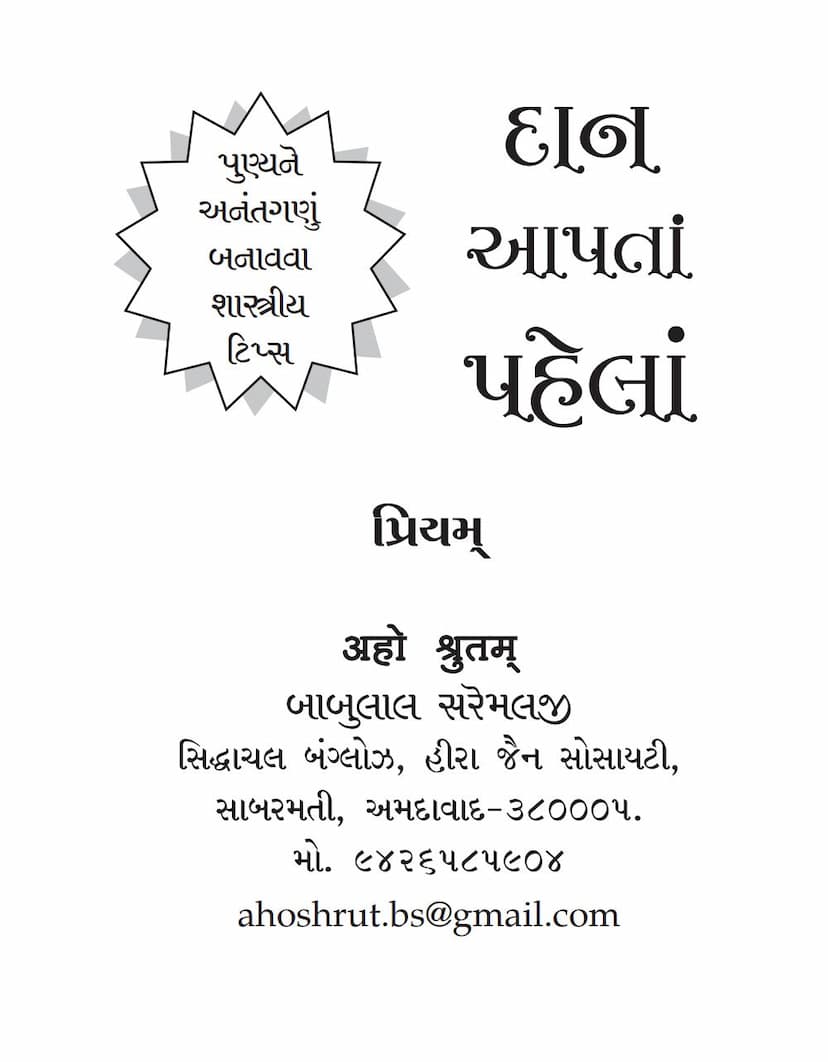Dan Aapta Pahela
Added to library: September 1, 2025

Summary
Here's a comprehensive summary of the Jain text "Dan Aapta Pahela" by Priyam, based on the provided pages:
Core Message: The book "Dan Aapta Pahela" (Giving is First) by Priyam, published by Ashapuran Parshwanath Jain Gyanbhandar, offers classical tips for making donations infinitely rewarding within the Jain tradition. The central theme is that the true value of a donation lies not just in the act itself, but in the intention, the recipient, and the way it aligns with Jain principles.
Key Principles for Maximizing Donation's Merit:
-
The Trifecta of a Meritorious Donation: The fruitfulness of a donation is directly proportional to the elevation of three aspects:
- Chitta (Heart/Intention): The bhavas (sentiments or emotions) behind the donation.
- Vitta (Wealth/Thing): The actual item or wealth being donated.
- Patra (Recipient): The person or entity receiving the donation.
-
The Supreme Recipients (Patras): Dev (divine beings), Guru (spiritual preceptors), and Sangha (the Jain community/monastic order) are considered the most excellent recipients in the world. Donating to them, even a small amount, becomes an inexhaustible treasure, leading to continuous supreme happiness and ultimate liberation.
-
The Seven Excellent Fields of Donation: Within the Jain tradition, donations made to these seven specific areas yield the most significant results:
- Jinalaya (Temples)
- Jinapratima (Idols of Tirthankaras)
- Jinavani (Sacred Jain scriptures/teachings)
- Sadhu (Monks)
- Sadhvi (Nuns)
- Shravak (Male lay followers)
- Shravika (Female lay followers)
-
Differentiating Donation Types:
- Dayapoorvak Dan (Donation out of Compassion): Given to those who are deserving of compassion (dayapatra).
- Bhaktipurvak Dan (Donation out of Devotion): Given to those who are truly worthy recipients (supatra).
- The Error of Indiscriminate Giving: Donors who lack this discernment between compassion and devotion commit transgressions, essentially committing a form of sin.
-
The True Nature of Compassion (Anukampa):
- Jain compassion is vast and subtle, encompassing kindness not only to humans but also to insects and even to elemental beings (pruthvikay).
- However, a donation that benefits only a few while causing severe harm to many is not considered true compassion.
- Purpose of Compassion-Based Donations: These donations, like those to food kitchens or other charitable acts, are justifiable when their specific purpose is the propagation of the Jain faith (Shasan Prabhavana). They aim to inspire appreciation for Jainism, planting seeds of spiritual understanding that lead to eternal well-being.
-
The Importance of Jain Dharma in Compassion:
- Those who neglect the principles of Jainism while performing acts of compassion fail to uphold the true objective of such donations and miss out on their genuine rewards.
- Prioritizing secular institutions (schools, hospitals, orphanages, etc.) over the seven core Jain fields, or donating without considering the glory and principles of Jainism, is akin to planting lemon seeds and expecting oranges – a futile effort. Such donations dilute their potential merit.
-
Giving with Wisdom and Dharma:
- Donating simple provisions like khichdi is good, but it's far better to imbue it with Dharma. This means ideally facilitating a spiritual discourse or providing religious guidance alongside the material help. While food satisfies for a day, Dharma alleviates suffering across lifetimes.
- When offering physical comfort, like a blanket, consider the donor's role in preventing the recipient's suffering in future lives, such as in hellish realms. This elevated thought magnifies the merit of the donation.
-
Balancing the Finite and the Infinite:
- Life is short, but the future is immense. When donating, consider both the immediate "small" (alp) benefit and the "infinite" (anant) future implications. This perspective makes the donation infinitely more rewarding.
-
Upholding the Reverence for Tirthankaras:
- During events like Lord Mahavir's birthday, simply giving blank notebooks is less meritorious than gifting the story of Lord Mahavir's divine life. Filling the material gift with spiritual essence elevates its value immeasurably. Neglecting the Tirthankara on their own auspicious occasion is a form of disrespect (ashatana).
-
Strategic Donations for Maximum Merit:
- Conditional Giving: Donating to a hospital with the stipulation that rooms are reserved for monks and they receive free treatment significantly amplifies the donor's merit. Similarly, donating to a school on the condition that the "Navkar Mahamantra" is recited daily and the school is named after it ensures the donor's donation yields immense, multi-generational benefits.
- Influencing the Community: Bringing a spiritual scholar to a donation event and facilitating a discourse can inspire reverence for Jainism in hundreds of souls, making the donation exceptionally fruitful.
- Focus on Need: Donating to areas of greatest need within the Jain tradition yields superior results. The text highlights the present critical need for "samyak jnan" (right knowledge) within the Shri Sangh. Donations that elevate the level of right knowledge can resolve many current problems and usher in a new era for Jainism. Such "Jnana Daan" (donation of knowledge) is a treasure for both the giver and the receiver.
-
The Ultimate Guide: Jain Commandments (Jinagna):
- In every action, including donation, the paramount consideration should be: "What has my Bhagavan (Lord) said about this? What is my Lord's command on this matter?"
- Following Jain Commandments Leads to Liberation: Those who act in accordance with Jain commandments will undoubtedly attain liberation. Conversely, those who act based on their own interpretation of "good" will find their actions leading to further entanglement in the cycle of birth and death (samsara).
In essence, "Dan Aapta Pahela" guides Jain devotees to move beyond mere charitable acts and embrace a form of giving that is deeply aligned with Jain philosophy, ensuring that every donation becomes a profound step towards spiritual advancement and eternal well-being.